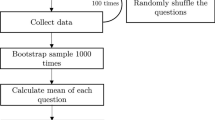Abstract
The rise of the blogosphere raises important questions about the elicitation and aggregation of information, and about democracy itself. Do blogs allow people to check information and correct errors? Can we understand the blogosphere as operating as a kind of marketplace for information along Hayekian terms? Or is it a vast public meeting of the kind that Jurgen Habermas describes? In this article, I argue that the blogosphere cannot be understood as a Hayekian means for gathering dispersed knowledge because it lacks any equivalent of the price system. I also argue that forces of polarization characterize the blogosphere as they do other social interactions, making it an unlikely venue for Habermasian deliberation, and perhaps leading to the creation of information cocoons. I conclude by briefly canvassing partial responses to the problem of polarization.
Similar content being viewed by others
References
Adamic, L., & Glance, N. (2005). The political blogosphere and the 2004 election: divided they blog. Available at http://www.blogpulse.com/papers/2005/AdamicGlanceBlogWWW.pdf.
Aristotle (1972). Politics. London: Oxford University Press (translated by E. Barker).
Baron, R., Hoppe, S. I., Kao, C. F., Brunsman, B., Linneweh, B., & Rogers, D. (1996). Social corroboration and opinion extremity. Journal of Experimental Social Psychology, 32, 537–560.
Brown, R. (1985). Social psychology (2nd ed.). New York: Free Press.
Habermas, J. (1979). What is universal pragmatics? In Communication and the evolution of society. Boston: Beacon (translated by T. McCarthy).
Habermas, J. (1999). Between facts and norms: an author’s reflections. Denver University Law Review, 937, 940–941.
Hastie, R., Schkade, D., & Sunstein, C. R. (2007). Political deliberation and ideological amplification: an experimental investigation. California Law Review.
Hayek, F. (1984). The use of knowledge in society. In C. Nishiyama & K. Leube (Eds.), The essence of Hayek. Stanford: Hoover.
Posner, R. (2004). Introduction to the Becker–Posner blog. http://www.becker-posner-blog.com/archives/2004/12/introduction_to_1.html, December.
Rawls, J. (1971). A theory of justice. Cambridge: Belknap.
Schkade, D., Sunstein, C. R., & Kahneman, D. (2000). Deliberating about dollars: the severity shift. Columbia Law Review, 100, 1139–1175.
Sunstein, C. (2006). Infotopia: how many minds produce knowledge. New York: Oxford University Press.
Sunstein, C. R., Schkade, D., Ellman, L. M., & Sawicki, A. (2006). Are judges political? An empirical investigation of the federal judiciary. Washington: Brookings.
Turner, J. C. (1987). Rediscovering the social group: a self-categorization theory. New York: Blackwell.
Author information
Authors and Affiliations
Corresponding author
Additional information
This essay draws on some discussion by Sunstein (2006). I am very grateful to Dan Drezner and Henry Farrell for suggestions and help.
Rights and permissions
About this article
Cite this article
Sunstein, C.R. Neither Hayek nor Habermas. Public Choice 134, 87–95 (2008). https://doi.org/10.1007/s11127-007-9202-9
Received:
Accepted:
Published:
Issue Date:
DOI: https://doi.org/10.1007/s11127-007-9202-9




